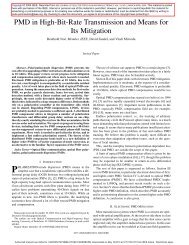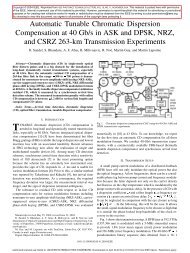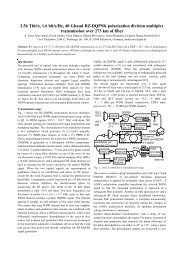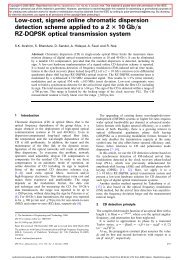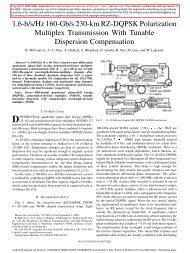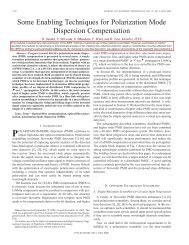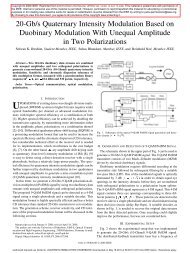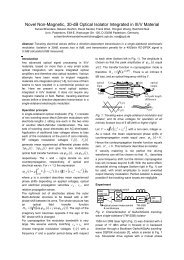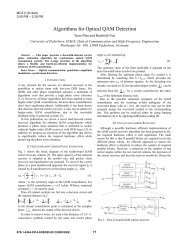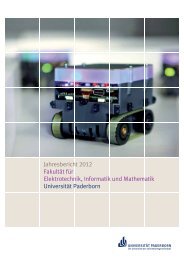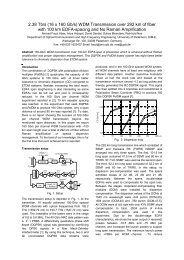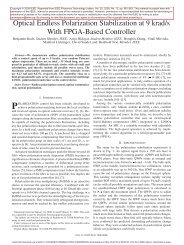Surface Mount Capacitive Silicon Absolute Pressure Sensor KP120 ...
Surface Mount Capacitive Silicon Absolute Pressure Sensor KP120 ...
Surface Mount Capacitive Silicon Absolute Pressure Sensor KP120 ...
You also want an ePaper? Increase the reach of your titles
YUMPU automatically turns print PDFs into web optimized ePapers that Google loves.
Data Sheet,V1.1, Oct. 2003<br />
<strong>Surface</strong> <strong>Mount</strong> <strong>Capacitive</strong> <strong>Silicon</strong><br />
<strong>Absolute</strong> <strong>Pressure</strong> <strong>Sensor</strong><br />
<strong>KP120</strong>, <strong>KP120</strong> Exxxx<br />
<strong>Sensor</strong>s<br />
Never stop thinking.
Edition 2003-10-17<br />
Published by Infineon Technologies AG,<br />
St.-Martin-Strasse 53,<br />
81669 München, Germany<br />
© Infineon Technologies AG 2003.<br />
All Rights Reserved.<br />
Attention please!<br />
The information herein is given to describe certain components and shall not be considered as a guarantee of<br />
characteristics.<br />
Terms of delivery and rights to technical change reserved.<br />
We hereby disclaim any and all warranties, including but not limited to warranties of non-infringement, regarding<br />
circuits, descriptions and charts stated herein.<br />
Information<br />
For further information on technology, delivery terms and conditions and prices please contact your nearest<br />
Infineon Technologies Office (www.infineon.com).<br />
Warnings<br />
Due to technical requirements components may contain dangerous substances. For information on the types in<br />
question please contact your nearest Infineon Technologies Office.<br />
Infineon Technologies Components may only be used in life-support devices or systems with the express written<br />
approval of Infineon Technologies, if a failure of such components can reasonably be expected to cause the failure<br />
of that life-support device or system, or to affect the safety or effectiveness of that device or system. Life support<br />
devices or systems are intended to be implanted in the human body, or to support and/or maintain and sustain<br />
and/or protect human life. If they fail, it is reasonable to assume that the health of the user or other persons may<br />
be endangered.
<strong>Surface</strong> <strong>Mount</strong> <strong>Capacitive</strong> <strong>Silicon</strong> <strong>Absolute</strong> <strong>Pressure</strong><br />
<strong>Sensor</strong><br />
<strong>KP120</strong>, <strong>KP120</strong> Exxxx<br />
Features<br />
• Ratiometric analog output<br />
• Calibrated transfer function<br />
• High accuracy over a large temperature range<br />
(1.5 kPa max. error over 0 ... 85 °C)<br />
• CMOS compatible surface micromachining<br />
• SMD housing<br />
• Customized transfer functions available<br />
(<strong>KP120</strong> Exxxx)<br />
P-DSOF-8-5<br />
Type<br />
Ordering<br />
Code<br />
Product Description<br />
<strong>Pressure</strong> Range<br />
Overall<br />
Accuracy<br />
Package<br />
<strong>KP120</strong> Q62705-K352 40 kPa - 115 kPa 1.2 kPa P-DSOF-8-5<br />
The <strong>KP120</strong> is a miniaturized absolute pressure sensor IC based on the capacitive<br />
principle. It is surface micromachined with a monolithic integrated signal conditioning<br />
circuit realized in the state-of-the-art 0.8 µm BiCMOS technology. As the <strong>KP120</strong> is a high<br />
precision IC for cost critical solutions the chip is packaged in a low cost SMD housing.<br />
High accuracy and high sensitivity enable the dedication in automotive applications as<br />
well as consumer products.<br />
In the automotive field the manifold air pressure (MAP) and barometric air pressure<br />
(BAP) are important parameters to compute the air-fuel ratio provided to the engine and<br />
for controlling spark advance to optimize engine efficiency.<br />
The IC consists of a surface micromachined pressure sensor, a sigma-delta A/Dconverter,<br />
a digital filter and the SPI-interface. In normal operation, the applied pressure<br />
has to be in the range between 10 kPa and 150 kPa and the <strong>KP120</strong>, <strong>KP120</strong> Exxxx can<br />
deliver output voltages between 0.25V and 4.85V.<br />
Data Sheet 3 V1.1 2003-10-17
<strong>KP120</strong>, <strong>KP120</strong> Exxx<br />
Pin Configuration<br />
(top view)<br />
Figure 1<br />
Pin Definitions and Functions<br />
Pin No. Symbol Function<br />
1 N.C. Not to be connected<br />
2 SERIAL_CLK/<br />
PROG_VOLT<br />
Used for calibration in manufacturing<br />
3 SERIAL_IN Used for calibration in manufacturing<br />
4 SERIAL_OUT Used for calibration in manufacturing<br />
5 V DD 5 V Supply voltage<br />
6 GND 0 V Circuit ground potential<br />
7 V OUT Output<br />
8 N.C. Not to be connected<br />
Data Sheet 4 V1.1, 2003-10-17
<strong>KP120</strong>, <strong>KP120</strong> Exxx<br />
Figure 2<br />
Block Diagram of the <strong>KP120</strong><br />
Data Sheet 5 V1.1, 2003-10-17
<strong>KP120</strong>, <strong>KP120</strong> Exxx<br />
Transfer Function<br />
The device is fully calibrated on delivery. The sensor has a linear transfer function<br />
between the applied pressure and the output signal:<br />
V OUT = V DD × (a × p + b)<br />
The output is ratiometric.<br />
The gain a and the offset b are calibrated to realize the demanded transfer function.<br />
Transfer Function <strong>KP120</strong><br />
With the parameters a and b the following calibration is adjusted:<br />
p N, MIN = 40 kPa → V OUT = 0.5 V and<br />
p N, MAX<br />
= 115 kPa→ V OUT<br />
= 4.5 V.(@V DD<br />
= 5 V)<br />
The nominal transfer function for <strong>KP120</strong> is given by:<br />
p<br />
V OUT<br />
= 5.000 V × ( 0.01067 × ---------- – 0.32667)<br />
kPa<br />
Figure 3<br />
Nominal Transfer Function for the <strong>KP120</strong> Version<br />
Data Sheet 6 V1.1, 2003-10-17
<strong>KP120</strong>, <strong>KP120</strong> Exxx<br />
<strong>Absolute</strong> Maximum Ratings<br />
Parameter Symbol Limit Value <strong>KP120</strong><br />
and <strong>KP120</strong> Exxxx<br />
min.<br />
max.<br />
Supply voltage V DD – 0.3 6.0 V<br />
Supply voltage 1)<br />
1) 1h@70 °C<br />
V DD – 16.5 V<br />
<strong>Pressure</strong> overload (300 sec.) P MAX<br />
– 360 kPa<br />
Burst pressure p BURST 400 – kPa<br />
Ambient Temperature T A – 40 125 °C<br />
Unit<br />
Note: Stresse above those listed here may cause permanent damage to the device.<br />
Exposure to absolute maximum rating conditions for extended periods may affect<br />
device reliability.<br />
ESD Protection<br />
Human Body Model (HBM) tests according to:<br />
Standard EIA/JESD22-A114-B HBM (covers MIL STD 883D)<br />
Parameter Symbol Limit Values Unit Notes<br />
min.<br />
max.<br />
ESD-Protection V ESD – ± 2 kV R = 1.5 kΩ,<br />
C = 100 pF<br />
Data Sheet 7 V1.1, 2003-10-17
<strong>KP120</strong>, <strong>KP120</strong> Exxx<br />
Operating Range<br />
Parameter Symbol Limit Value Unit<br />
min. typ. max.<br />
Supply voltage V DD<br />
4.75 5.0 5.25 V<br />
Supply current @ 5 V I IN 2 – 9 mA<br />
Output current (sink/source) 1) I OUT – 0.25 0.25 mA<br />
Operating Ambient Temperature 2) T A – 40 – +125 °C<br />
Minimum rated pressure<br />
<strong>KP120</strong><br />
<strong>KP120</strong> Exxxx<br />
Maximum rated pressure<br />
<strong>KP120</strong><br />
<strong>KP120</strong> Exxxx<br />
<strong>Pressure</strong> span<br />
<strong>KP120</strong><br />
<strong>KP120</strong> Exxxx<br />
1) sink current:current into device<br />
source current:current driven by device<br />
2) -40 °C ... 125 °C (1000h),<br />
-40 °C ... 85 °C (5000h)<br />
p N, MIN<br />
–<br />
10<br />
p N, MAX<br />
–<br />
100<br />
P SPAN<br />
–<br />
70<br />
40<br />
–<br />
115<br />
–<br />
75<br />
–<br />
–<br />
50<br />
–<br />
150<br />
–<br />
105<br />
kPa<br />
kPa<br />
kPa<br />
Data Sheet 8 V1.1, 2003-10-17
<strong>KP120</strong>, <strong>KP120</strong> Exxx<br />
Electrical Characteristics<br />
V DD = 5 V, GND = 0 V, T A = 0 °C to +85 °C, unless otherwise specified.<br />
Parameter Symbol Limit Value Unit<br />
Output voltage at min. rated pressure 1)<br />
<strong>KP120</strong><br />
<strong>KP120</strong> Exxxx<br />
Output voltage at max. rated pressure 1)<br />
<strong>KP120</strong><br />
<strong>KP120</strong> Exxxx<br />
V OUT, MIN<br />
–<br />
0.25<br />
V OUT, MAX<br />
–<br />
4.5<br />
min. typ. max.<br />
0.5<br />
–<br />
4.5<br />
–<br />
–<br />
0.5<br />
–<br />
4.85<br />
Overall accuracy 2) A CC<br />
see page 11 kPa<br />
Ratiometricity 3)<br />
<strong>KP120</strong><br />
<strong>KP120</strong> Exxxx<br />
Response time 4) t R – 5 – ms<br />
Output ripple<br />
@ f > 1 kHz<br />
@ f < 1 kHz<br />
Stabilization time 5) – – 20 ms<br />
Rat<br />
–<br />
–<br />
–<br />
–<br />
5<br />
–<br />
–<br />
–<br />
–<br />
10<br />
10<br />
5<br />
V<br />
V<br />
mV<br />
mVpp<br />
1) The output of the sensor is ratiometric to the supply voltage V DD within its specified range of 4.75 to 5.25 V.<br />
2) Accuracy is the deviation in actual output from nominal output over the entire pressure and temperature<br />
range according to figure below due to all sources of error including the following:<br />
■Linearity:<br />
Output deviation from a straight line relationship with pressure over the specified pressure range.<br />
3) Definition:<br />
Rat =<br />
( ) – V OUT<br />
(@5 V)<br />
---------<br />
5 V<br />
V OUT<br />
@V DD<br />
for V OUT in the range of 0.1 × V DD to 0.9 × V DD<br />
and V DD in the range of 4.75 V to 5.25 V<br />
V DD<br />
4) Response time is defined as the time for the incremental change in the output to go from 10% to 90% of its<br />
final value when subjected to a specified step change in pressure.<br />
5) Stabilization time is defined as the time required for the product to meet the specified output voltage after the<br />
pressure has been stabilized.<br />
Data Sheet 9 V1.1, 2003-10-17
<strong>KP120</strong>, <strong>KP120</strong> Exxx<br />
Circuitry<br />
It is recommended, that the input circuit of the pressure sensor IC is protected against<br />
overload voltage and electro-magnetic influences. Therefore, a 100nF capacitance<br />
should be arranged in parallel (like shown in Figure 4).<br />
The output circuitry acts as a low pass decoupling filter (cut off frequency here: 720 Hz)<br />
between the output of the sensor IC and the A/D input of the µC.<br />
Note: Circuitries of customer specific applications may deviate from this circuitry.<br />
Figure 4<br />
Feasible In-/Output Circuitry of the <strong>KP120</strong>, <strong>KP120</strong> Exxxx<br />
The output circuit is protected against short circuit to V DD and GND.<br />
Data Sheet 10 V1.1, 2003-10-17
<strong>KP120</strong>, <strong>KP120</strong> Exxx<br />
Overall Accuracy<br />
The maximum temperature error is determined by a continuous line through four relevant<br />
break points:<br />
Break point (°C)<br />
Overall Accuracy (kPa)<br />
<strong>KP120</strong><br />
– 40 ± 2.4 ± 3.0<br />
0 ± 1.2 ± 1.5<br />
85 ± 1.2 ± 1.5<br />
125 ± 2.4 ± 3.0<br />
Overall Accuracy (kPa)<br />
<strong>KP120</strong> Exxxx<br />
Figure 5<br />
Overall Accuracy over Temperature<br />
Data Sheet 11 V1.1, 2003-10-17
<strong>KP120</strong>, <strong>KP120</strong> Exxx<br />
Package Outlines<br />
P-DSOF-8-5<br />
(Plastic Dual Small Outline Flat Package)<br />
GMX09490<br />
You can find all of our packages, sorts of packing and others in our<br />
Infineon Internet Page “Products”: http://www.infineon.com/products.<br />
Dimensions in mm<br />
Data Sheet 12 V1.1, 2003-10-17
<strong>KP120</strong>, <strong>KP120</strong> Exxx<br />
Revision History:V1.1<br />
Previous Version: 1.0<br />
Page Subjects (major changes since last revision)<br />
7,8 Sink and source current defined within operating range<br />
We Listen to Your Comments<br />
Any information within this document that you feel is wrong, unclear or missing at all<br />
Your feedback will help us to continuously improve the quality of this document.<br />
Please send your proposal (including a reference to this document) to:<br />
mcdocu.comments@infineon.com<br />
Data Sheet 13 V1.1, 2003-10-17
www.infineon.com<br />
Published by Infineon Technologies AG


